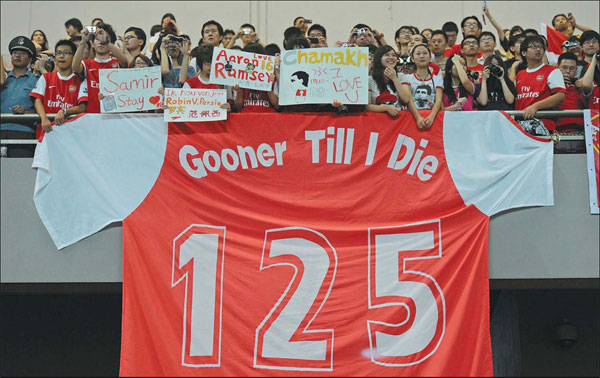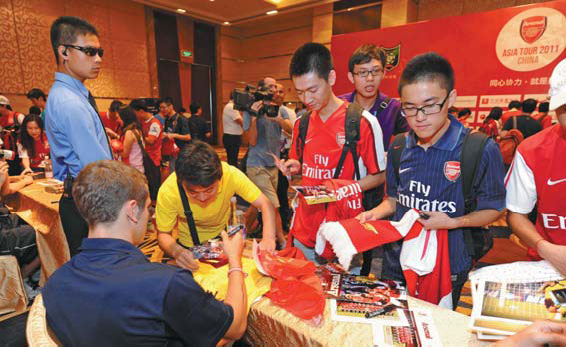Playing to the crowd
Updated: 2013-04-19 08:21
By David Bartram (China Daily)
|
||||||||
|
Leading European soccer clubs are targeting China's fast-growing soccer market to increase their international fan base. Provided to China Daily |
|
Arsenal soccer players met their fans in Hangzhou, Zhejiang province, in 2011. Provided to China Daily |
Europe's soccer clubs find a way to increase their fan base by reaching out to chinese fans
Leading soccer teams from across Europe are accustomed to battling for soccer's top trophies, but now they are also competing for a slice of China's fast-growing soccer market.
Despite problems with the domestic game, soccer remains China's most popular spectator sport. Most fans prefer to follow the world's best teams in England, Spain, Italy and Germany, rather than a local Chinese club.
A recent survey by market research company Kantar estimated that Manchester United alone has as many as 108 million followers in China.
Now, these European clubs, looking for extra income to balance the massive wages they pay their best players, are targeting China to increase their international fan base and revenue.
Teams including Manchester United, Real Madrid, Barcelona, Liverpool, Arsenal and Bayern Munich have all played pre-season exhibition matches in China in recent years. But clubs are also looking for ways to engage with Chinese fans year-round.
"Liverpool have always been one of the most popular soccer clubs in China but until we started to engage in the local language, it was very difficult to develop a deeper relationship with our Chinese fan base," says Paul Rogers, head of international digital development at Liverpool FC, one of Europe's most successful teams.
"The official website, being exclusively in English, was proving too much of a barrier to many fans, and in 2011, ahead of our first visit to the Chinese mainland, we launched an official presence on the Sina Weibo platform (China's equivalent of Twitter). The reaction from fans was extremely positive and while some clubs have more followers than the 430,000 we currently have, no other club can boast the levels of engagement our fans have with us on Sina Weibo."
Rather than simply translate content from its English-language site, Liverpool FC produces tailored content from a Shanghai office. The club has a presence on numerous online platforms across the Chinese Internet and engages directly with fans. For example, the club recently allowed fans to put questions directly to manager Brendan Rodgers via the Tencent QQ portal. Liverpool's Tencent account saw a growth of over 112,000 fans in a single week as a result.
Arsenal, another popular English club, has similarly turned its attention to China, highlighting the country as the No 1 priority for international growth.
"Over the past two years, China has become the focus of our international strategy," says Charles Allen, head of marketing at Arsenal. "China is developing fast as a soccer-loving market and has a high Internet penetration among young adults who live in big cities.
"These young men and women represent a big opportunity for us to connect with on a digital basis. There are Arsenal fans all over the world and we have chosen China as the single focus from where to build our international presence in a more meaningful and relevant way."
The club creates tailored content for its Chinese fans that ties into Arsenal's visits to China, including videos of captain Thomas Vermaelen trying his hand at Shaolin martial arts and manager Arsene Wenger playing table tennis.
This approach is beginning to be adopted by other major teams. Spanish club Real Madrid recently released a video in which players such as Cristiano Ronaldo wished Chinese fans a happy Chinese New Year, with World Cup winning goalkeeper Iker Casillas doing it in Mandarin.
But despite this increased engagement with fans across China, the dilemma clubs face lies in monetizing their growing numbers of supporters. At Arsenal, Allen concedes that the priority for the time being remains connecting with as many Arsenal fans as possible. At Liverpool, the club has taken the first steps toward making its following in China more profitable.
"Many of our supporters were telling us they couldn't understand our English-language online store and that the cost of shipping from the UK was too expensive," Rogers says. "We took this feedback on board and have launched an online store in China, in the local language and locally distributed, which has benefited both the fans and the club."
The fight to reach fans is not just restricted to clubs. With international television rights now a multibillion-euro industry, the governing bodies of Europe's top leagues are also competing for fans in China. They face challenges not just from rival football associations, but also from other sports, particularly basketball.

There has been some concern that the failure of China's national team to improve upon its only appearance at a FIFA World Cup in 2002 is hurting the popularity of the game within the country.
There are other factors turning Chinese fans off football too, particularly a series of corruption scandals within the domestic game and increasing competition from the NBA. It does not help that several Chinese players have proved successful in the US basketball league, something that has yet to happen at football's highest level.
Yet despite unattractive kickoff times, time differences mean many of Europe's biggest football matches are played through the night in China demand for the big matches remains high.
England's Premier League, the most watched football league in the world, and is said to have a TV audience of 4.7 billion, has recently signed a six-year agreement with SuperSports Media to broadcast matches in China. The Premier League mostly signs three-year deals in other countries.
"We believe a longer-term strategy with the right partner is the best way to further engage with Premier League fans in China," says Nick Noble, a spokesman for the league. "The Premier League and SuperSports have developed a strong working relationship, and the model is attractive to viewers and commercial sponsors."
The Premier League has licensed SuperSports to handle distribution of matches since 2010. Before then, there was some criticism in China over its decision to license broadcasting rights exclusively to a pay TV company, limiting audience numbers in the country.
During this period, rival leagues such as Germany's Bundesliga that were available on regional and free-to-air channels gained in popularity. But the new deal ensures that for the next six years Premier League matches will be distributed to regional channels across China and also be available online.
The deal also includes a joint marketing agreement that will probably involve the promotion of the league and participating clubs across multiple platforms. The Premier League will return to Hong Kong this summer to host the Barclays Asia Trophy, a pre-season tournament between three English teams and local club South China.
Liverpool competed in the Asia Trophy in 2007, losing the final on penalties. The club will be heartened that the Premier League is providing solid foundations upon which individual clubs can continue to expand in China.
"We're trying to improve the experience for all of our supporters, no matter where in the world they live," says Rogers of Liverpool FC. "If we can grow our fan base, strongly engage them and make supporting easier and more enjoyable, then the rewards will come."
China Daily
(China Daily 04/19/2013 page16)

 Li Na on Time cover, makes influential 100 list
Li Na on Time cover, makes influential 100 list
 FBI releases photos of 2 Boston bombings suspects
FBI releases photos of 2 Boston bombings suspects
 World's wackiest hairstyles
World's wackiest hairstyles
 Sandstorms strike Northwest China
Sandstorms strike Northwest China
 Never-seen photos of Madonna on display
Never-seen photos of Madonna on display
 H7N9 outbreak linked to waterfowl migration
H7N9 outbreak linked to waterfowl migration
 Dozens feared dead in Texas plant blast
Dozens feared dead in Texas plant blast
 Venezuelan court rules out manual votes counting
Venezuelan court rules out manual votes counting
Most Viewed
Editor's Picks

|

|

|

|

|

|
Today's Top News
Boston bombing suspect reported cornered on boat
7.0-magnitude quake hits Sichuan
Cross-talk artist helps to spread the word
'Green' awareness levels drop in Beijing
Palace Museum spruces up
First couple on Time's list of most influential
H7N9 flu transmission studied
Trading channels 'need to broaden'
US Weekly

|

|









